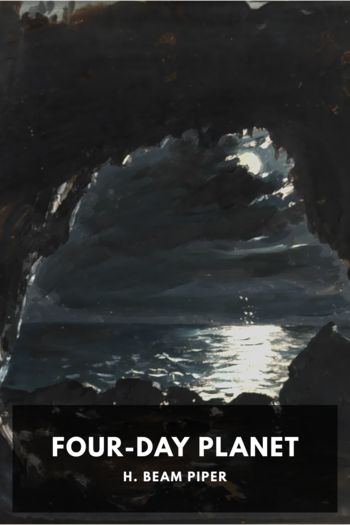Four-Day Planet, H. Beam Piper [best motivational novels .TXT] 📗

- Author: H. Beam Piper
Book online «Four-Day Planet, H. Beam Piper [best motivational novels .TXT] 📗». Author H. Beam Piper
We picked parties, trying to get men who had enough clothing and hadn’t been too badly banged around in the landing. Tom wanted to go along, but Abdullah insisted that he stay and help with the inspection of the boat’s engines. Finally six of us—Llewellyn, myself, Glenn Murell, Abe Clifford, old Piet Dumont, and another man—went out through the broken stern of the boat. We had two portable floodlights—a scout boat carries a lot of equipment—and Llewellyn took the one and Clifford the other. It had begun to snow already, and the wind was coming straight up the narrow ravine into which we had landed, driving it at us. There was a stream between the two walls of rock, swollen by the rains that had come just before the darkness, and the rocks in and beside it were coated with ice. We took one look at it and shook our heads. Any exploring we did would be done without trying to cross that. We stood for a few minutes trying to see through the driving snow, and then we separated, Abe Clifford, Dumont and the other man going up the stream and Ramón Llewellyn, Glenn Murell and I going down.
A few hundred yards below the boat, the stream went over a fifty-foot waterfall. We climbed down beside it, and found the ravine widening. It was a level beach, now, or what had been a beach thousands of years ago. The whole coast of Hermann Reuch’s land is sinking in the Eastern Hemisphere and rising in the Western. We turned away from the stream and found that the wind was increasing in strength and coming at us from the left instead of in front. The next thing we knew, we were at the point of the mountain on our right and we could hear the sea roaring ahead and on both sides of us. Tom had been right about that V-shaped fjord, I thought.
We began running into scattered trees now, and when we got around the point of the mountain we entered another valley.
Trees, like everything else on Fenris, are considerably different from anything analogous on normal planets. They aren’t tall, the biggest not more than fifteen feet high, but they are from six to eight feet thick, with all the branches at the top, sprouting out in all directions and reminding me of pictures of Medusa. The outside bark is a hard shell, which grows during the beginning of our four hot seasons a year. Under that will be more bark, soft and spongy, and this gets more and more dense toward the middle; and then comes the hardwood core, which may be as much as two feet thick.
“One thing, we have firewood,” Murell said, looking at them.
“What’ll we cut it with; our knives?” I wanted to know.
“Oh, we have a sonocutter on the boat,” Ramón Llewellyn said. “We can chop these things into thousand-pound chunks and float them to camp with the lifters. We could soak the spongy stuff on the outside with water and let it freeze, and build a hut out of it, too.” He looked around, as far as the light penetrated the driving snow. “This wouldn’t be a bad place to camp.”
Not if we’re going to try to work on the boat, I thought. And packing Dominic, with his broken leg, down over that waterfall was something I didn’t want to try, either. I didn’t say anything. Wait till we got back to the boat. It was too cold and windy here to argue, and besides, we didn’t know what Abe and his party might have found upstream.
Castaways WorkingWe had been away from the boat for about two hours; when we got back, I saw that Abdullah and his helpers had gotten the deck plates off the engine well and used them to build a more substantial barricade at the ruptured stern. The heater was going and the boat was warm inside, not just relatively to the outside, but actually comfortable. It was even more crowded, however, because there was a ton of collapsium shielding, in four sections, and the generator and power unit, piled in the middle. Abdullah and Tom and Hans Cronje were looking at the converters, which to my not very knowing eye seemed to be in a hopeless mess.
There was some more work going on up at the front. Cesário Vieira had found a small portable radio that wasn’t in too bad condition, and had it apart. I thought he was doing about the most effective work of anybody, and waded over the pile of engine parts to see what he was doing. It wasn’t much of a radio. A hundred miles was the absolute limit of its range, at least for sending.
“Is this all we have?” I asked, looking at it. It was the same type as the one I carried on the job, camouflaged in a camera case, except that it wouldn’t record.
“There’s the regular boat radio, but it’s smashed up pretty badly. I was thinking we could do something about cannibalizing one radio out of parts from both of them.”
We use a lot of radio equipment on the Times, and I do a good bit of work on it. I started taking the big set apart and then remembered the receiver for the locator and got at that, too. The trouble was that most of the stuff in all the sets had been miniaturized to a point where watchmaker’s tools





Comments (0)